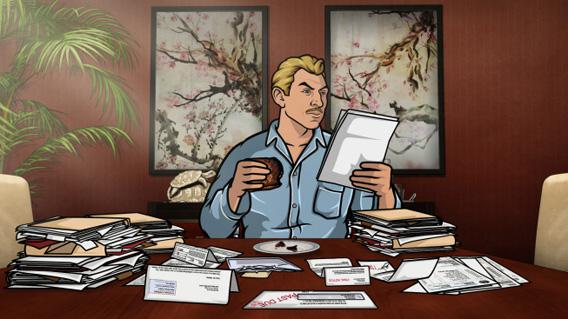In Slate’s Archer TV Club, Jeremy Stahl will IM each week with a different fan of the FX spy comedy. This week he chats with A.V. Club TV Editor and Archer fanatic Todd VanDerWerff.
Jeremy Stahl: Todd! Thanks very much for joining me this week! You do one of my favorite Archer reviews. Personally, I was really happy with this week’s episode. One of the biggest plot points that I was curious about at the start of the season was what would happen to Ray and his legs. What did you think?
Todd VanDerWerff: Thanks, Jeremy. I agree that this is the first episode of the season to fully click for me in the way so many third-season episodes did. I think a big part of that is due to two of Archer’s secret weapons, as I discuss in my review.
The first is the show’s editing, which finally attains full rat-a-tat power here with dialogue pinging all over the place and a really great opening montage of Ray going about his day in frustration to better make the audience feel why he’d decide to get the robot legs, no matter the risks.
The second is just the fact that Archer often excels when it contrives to do an episode that’s set entirely in the ISIS office. This is the first “bottle episode” of the season (and I use that term even though the idea of a “bottle episode” for an animated show is pretty much impossible), and it succeeds wildly. Everybody’s going to go to Rome, but they never actually leave. When all of the characters are in the office, it seems like the show gets even WEIRDER, and weirder is where Archer shines.
Jeremy Stahl: That opening sequence was stupendous (“good morning bittersweet memories”). Just to summarize: Ray’s life is terrible because Archer’s reckless space-shuttle piloting paralyzed him at the end of last season. (To boot, Archer now steals his handicap parking spot.) This drives Ray to accept Krieger’s offer to turn him into a cyborg. Once Archer hears about the cyborgification process, he insists on staying in the office to try to thwart Ray’s operation/reconstruction.
You’re right, weirdness is absolutely what this show does best—that’s why the Bob’s Burger intro to Episode 1 and that bleak, surprising finale to last week’s episode worked so well. For me, this episode was also able to do more than the first two because every plot twist and most of the gags were based on callbacks. The best episodes of this show reward return viewers to almost the same extent as Arrested Development—to which Archer is often compared. And this episode had too many callbacks to count—Krieger resuscitating Katya; Krieger giving Conway Stern a Luke Skywalker hand; the pig in the break room; Brett’s ability to be at the wrong place at the wrong time even if he’s on a different floor; Archer’s terror at half-human, half-machine constructions stemming from his childhood “accident” with a homemade half-human, half-vacuum cleaner; and on and on. And of course, “MOP!”
You review a lot of different types of television shows. How does Archer stack up relative to other series in terms of the richness of the world?
Todd VanDerWerff: Increasingly, I find that this kind of textured world-building is the rule rather than the exception in TV comedy. Arrested Development didn’t pioneer it, but it certainly took it to a new level. These days, even The Big Bang Theory has a pretty richly imagined universe just off-screen.
That said, I’d agree that Archer takes this to a degree beyond most other TV comedies, and I think a lot of that has to stem from Adam Reed, who has written the bulk of the show’s run without a writer’s room. That means Archer is even more of a peek into one man’s head than TV usually allows, and it lets Reed come up with a bunch of stuff that he can play around with and call back to (though even he will admit he sometimes forgets about or omits stuff).
Archer is helped by being animated, too, allowing it to wander all over the place and have plot points that take place on other continents or in outer space. But I’m also always impressed by how much mileage the show gets out of not showing. I talked a lot in the series’ first season about how it has got a lot of radio comedy at its heart. There are still frequent moments where everybody is talking about some awful thing that happened—Fourth of Ju-luau—and we never quite get to see it. The imagination is key, and Archer leaves us to fill in the details.
Jeremy Stahl: I love how the show leaves it to the viewer to figure out what went wrong at the Fourth of Ju-luau, why Krieger takes so many seemingly random freelance gigs, and what the hell they were going to Rome for anyways (aside from shoes). But what I love even more is when the show fills in these gaps in subsequent episodes, like with the Fourth of Ju-luau, which was a callback to last week’s mysterious dead pig in the break room. The fact that Reed has been able to create and resolve these mysteries so consistently is what keeps me watching. I’m really looking forward to seeing what Conway Stern does with his cyborg hand and why Krieger built it for him in the first place.
Anyway, thanks again for taking the time to chat with me. We’ve been having problems with the radiator in the Slate D.C. offices (true story), so I need to run to go make sure that Skynet hasn’t turned on Maximum Overdrive (maybe less true).
Todd VanDerWerff: Thanks for having me, Jeremy. This season of Archer got off to a slower start than the last one, but I’m glad to see it roaring back to life. I hope to see you again—if only in the A.V. Club comments.
